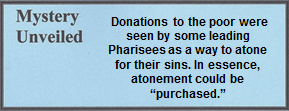08.03.02 Mt. 6:1
PRINCIPLES OF RIGHTEOUSNESS
1 Be careful not to practice your righteousness in front of people, to be seen by them. Otherwise, you will have no reward from your Father in heaven.
“Practice your righteousness.” Righteousness was practiced by the giving of alms (Gk. eleemosune, 1654) mainly by giving to the poor. The term signifies pity and mercy.[1] Jesus presented the three acts of life, at times known as three “Pillars of Faith” that demonstrated whether one was righteous. These were common knowledge, are found in various rabbinic writings, reinforced the Old Testament code of righteousness, and were considered the fruit of a holy lifestyle. These three acts were,
- Giving to others (Mt. 6:2-4)
- Prayer (Mt. 6:5-15), and
- The secret personal discipline of fasting (Mt. 6:16-18)
The Jewish leaders believed that they would have eternal life simply because they were God’s chosen people, but they still needed to demonstrate these three acts of righteousness. Consequently, some of them were proud to demonstrate such in a public display (see also Mt. 6:2-4 below). Two books written in the second century B.C. illustrate the act of almsgiving and it was believed that sins could be pardoned with a “purchase” of almsgiving. These accounts have been preserved in a collection of books known as the Apocrypha. Note the following examples:
Give alms from your possessions to all who live uprightly, and do not let your eye begrudge the gift when you make it. Do not turn your face away from any poor man, and the face of God will not be turned away from you. If you have many possessions, make your gift from them in proportion; if few, do not be afraid to give according to the little you have. So you will be laying up a good treasure for yourself against the day of necessity. For charity delivers from death and keeps you from entering the darkness; and for all who practice it charity is an excellent offering in the presence of the Most High.
Tobit 4:7-11[2]
Water extinguishes a blazing fire so almsgiving atones for sin.
Ben Sirach 3:30
Do not grieve the one who is hungry
nor anger the man in want
Do not add to the troubles of an angry mind
nor delay your gift to the beggar.
Do not reject an afflicted suppliant
nor turn your face from the poor
Do not avert your eye from the needy,
nor give a man occasion to curse you.
Ben Sirach 4:2-5
Do not be fainthearted in your prayer nor neglect to give alms.
Ben Sirach 7:10
Store up almsgiving in your treasury and it will rescue you from all afflictions.
Ben Sirach 29:12
It is better to give alms than to lay up gold; almsgiving delivers one from death and it purges away all sin.
Tobit 12:8
Giving to the poor is an established principle in the Mosaic laws and was reinforced during the Inter-Testamental Period. By the first century some considered almsgiving as a sacred duty equal to righteousness. This and other acts of charity were considered acts towards perfection and becoming “fully righteous.” However, by the time of Jesus, some rabbis said the term “fully righteous” also included observing the entire Torah.[3] A possible reason is that the Hebrew word tzedakah can be translated to mean both almsgiving and righteousness.[4] Jesus did not challenge the idea that almsgiving would be a credit to one’s divine account, but He did say that it should be done privately in God’s sight without the praise and credit of men. The cultural meaning of righteousness has always been giving to the poor or expressing kindness, especially in situations when it would not be expected. But Jesus introduced a new definition of righteousness – that is to have an ongoing relationship with God.

[1]. Vine, “Alms, Almsdeeds.” Vine’s Complete Expository Dictionary. 2:23.
[2]. Ben Sirach and Tobit belong to a classification of extra-biblical books known as the Apocrypha. These two literary works reflect the opinions of many Jewish people. See 02.02.03 “Apocrypha” for more information. The reader is reminded that quotations from non-biblical sources are not to be understood as being of equal authority with the biblical narratives. See 01.02.04.
[3]. Jeremias, Jerusalem in the Time of Jesus. 127.
[4]. Barclay, “Matthew.” 1:187.